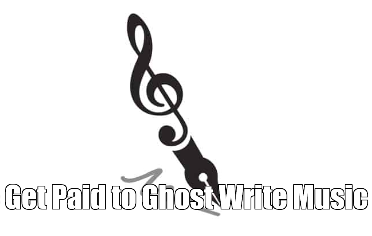
Ghostwriting songs is a fantastic opportunity for you to earn money while doing what you love. Although it may not bring you publicity, it certainly can get you a foot in the music industry. This guide will show you step by step how Australians can get paid as music ghostwriters, including what you need to start, what qualifications and skills are necessary, where to search for clients and what your earning potential is.
If you are willing to hustle, ghostwriting can be a great way to make money whether you are writing lyrics, melodies, or even full compositions. It may appear a bit intimidating at first glance, but allow this article to help you unravel this intriguing endeavor.
What Does It Mean to Ghostwrite Music?
First, let’s define what ghostwriting means for music. Picture a person songwriting, composing, or drafting pieces for an artist but only to be paid and not credited in return. This is a common practice in the music industry because types of artists exist who, due to personal issues, are unable to write or create their own material. The artist’s name gets put on the end product which means that ghostwriters do not get credited for their work. Ghostwriting might not seem appealing at face value simply because of the lack of recognition, but it helps writers make a name without being in the public eye.
You can ghostwrite for:
- Singers and songwriters lacking songwriting skills
- Producers or studios looking for unique material
- Bands in need of fresh perspectives
- TV, film, or commercial projects requiring custom music
It’s a lucrative niche, but you need a blend of creativity, professionalism, and business savvy to succeed.
Skills You Need to Get Paid to Ghostwrite Music
To thrive as a ghostwriter, you need specific skills that set you apart. While musical talent is a given, there are several other skills that can help ensure long-term success.
1. Songwriting Skills
Basically, it all boils down to writing fantastic songs. Knowing how to utilize structure, rhythm, word patterns, and storytelling throughout the song will help you satisfy the client and his requirements. In return, they will pay you for how well you can shape hooks and craft catchy melodies.
2. Music Composition Abilities
Some clients will assume that fully written, composed pieces of music, are always more than just lyrics. Being able to play instruments, build the arrangement, and produce tracks that are demo-ready are factors that will boost your worth in the market to a great extent.
3. Adaptability
Every artist or project has a distinct taste. You must be able to change your writing to accommodate various genres, voices, and branding. Whether it’s pop, rap, rock, or country, versatility solves the problem of losing out on too many opportunities.
4. Understanding the Music Business
Understanding the legal and commercial side of ghostwriting is equally important. For instance, you must know how to negotiate the payment, safeguard your work and deal with all aspects related to the rights or contracts.
5. Communication and Collaboration
What would also benefit you is being an active listener. This skill is imperative since each customer has different needs. Effective communication guarantees no excess expectations.
6. Software and Recording Skills
While you don’t need an elaborate studio setup, familiarity with music production tools such as Logic Pro, Ableton, or GarageBand can significantly expand your service range.
Steps to Start a Career Ghostwriting Music in Australia
Getting paid for your music ghostwriting requires a strategy. Here are the steps to start your career in a manageable way:
1. Build Your Portfolio
Before you approach clients, you need to showcase your skills. Write a few demo songs across different genres that demonstrate your ability to adapt. You don’t need professional-grade studio recordings—clean, clear demos will suffice.
Your portfolio might include:
- Lyrics only (for lyricists)
- Full demo tracks (if you compose music)
- Short samples showing different writing styles
2. Define Your Niche
While versatility is valuable, having a niche can help you stand out. For example, you might specialise in writing EDM hooks, rap verses, or radio-friendly pop songs. Defining a niche can make marketing yourself easier.
3. Set Your Rates
The question “How much do ghostwriters get paid?” has no simple answer. Rates can vary widely depending on your experience, the complexity of the project, and the client’s budget. While beginners might earn $100-$500 per song, seasoned professionals can command thousands. Don’t undersell yourself—research typical rates for ghostwriting in Australia and be ready to negotiate fair pay.
4. Sign Up on Freelance Platforms
The rise of online freelancing makes it easier than ever to find clients. Platforms like Fiverr, Upwork, and SoundBetter are great places to offer your services. Set up a compelling profile, upload portfolio material, and highlight your specialties.
5. Network in the Music Industry
Connections matter in any creative field. Attend music events, expos, or workshops in Australia to meet singers, producers, and other creatives. Building relationships can lead to repeat clients and word-of-mouth opportunities.
6. Pitch Your Services
If you know an artist who could benefit from custom songs, don’t be afraid to reach out. Send a brief email or message explaining how you can help and attach a relevant sample. Being proactive can open doors.
Finding Clients in Australia
Landing your first few clients is often the hardest part, but once you build traction, word spreads. Here are some dependable ways to connect with paying clients:
1. Social Media Marketing
Platforms like Instagram and TikTok are excellent for showcasing your songwriting skills. Post short snippets of your work or behind-the-scenes footage and use relevant hashtags (#songwriter #ghostwriter #musicproducerAU, etc.) to reach potential clients.
2. Collaborate Locally
Look for collaborations with budding Australian artists who might lack songwriting expertise. Collaborating not only sharpens your skills but can lead to paid projects through referrals.
3. Join Online Communities
Music-focused Facebook groups and forums are full of musicians looking for collaborators. Examples include groups for Australian singers or producers in search of original content.
4. Approach Small Studios
Recording studios often work with unsigned artists who need new material. Pitch your services to studios as a “go-to” songwriter for their clients.
5. Leverage Your Network
Word of mouth is incredibly powerful. Tell friends, family, and industry acquaintances about your ghostwriting services. They might know someone who needs your help.
6. Explore Job Boards
Freelance job boards often have listings for songwriters. Keep an eye on platforms like Freelancer.com or Gumtree for local opportunities.
How Much Can You Earn as a Ghostwriter?
Ghostwriting in music can be a part-time side hustle or a full-time career. Earnings will depend on factors like your skills, the type of clients you work with, and the amount of work you take on.
Breaking Down the Figures
- Beginner ghostwriters may earn $100-$500 per song or per project.
- Mid-level professionals can secure $500-$2,000 per track, especially when working with established clients.
- High-end ghostwriters for major-label artists could earn anywhere upwards of $5,000 or negotiate a percentage of royalties.
Ghostwriting rates are often project-based, but some clients may also offer long-term contracts if you align well with their style.
Tips for Success in Ghostwriting Music
To increase your chances of success, keep in mind the following tips:
- Over-Deliver
Always aim to exceed client expectations. Whether it’s submitting work ahead of the deadline or creating a few extra samples, going the extra mile can lead to repeat business. - Stay Professional
Ghostwriting is a business. Meet your deadlines, communicate clearly, and don’t take constructive criticism personally. - Learn Continuously
Stay updated on industry trends, new music styles, and emerging production tools. The more you know, the more valuable you’ll be. - Protect Your Work
Ensure clear payment agreements and keep copies or timestamps of all your submissions. Always sign contracts, especially for bigger projects. - Build a Reputation
The better your reputation, the more clients will trust you. Encourage satisfied clients to refer you to others or leave testimonials. - Be Patient
This field takes time. Your initial clients might be small, but as you gain experience, you’ll land higher-paying gigs.
Resources for Australian Ghostwriters
Here are some platforms and services to help you kickstart your music ghostwriting career:
- Fiverr and Upwork – Offer your services as a freelance ghostwriter.
- SoundBetter – A platform connecting professional songwriters and producers with clients.
- APRA AMCOS – Australia’s music rights organisation allows you to learn about licensing and songwriting credits.
- Coursera or Skillshare – Learn songwriting and production skills to sharpen your craft.
Final Thoughts
Getting paid for your talent in ghostwriting songs is an artistic and fulfilling process because not only are you getting paid, but you are also assisting artists realize their goals. For Australians, it allows them to be their own boss, earn good money, and still indulge in music as a ghostwriter without performing or composing. Although it takes time and hard work to establish oneself in ghostwriting, the payoff which includes financial security and self-satisfaction, makes all the effort worthwhile. With the right attitude, business approach, and social networking, it is indeed possible to do what you enjoy – music – and make a successful professional life out of it.




